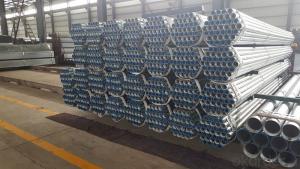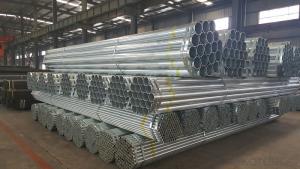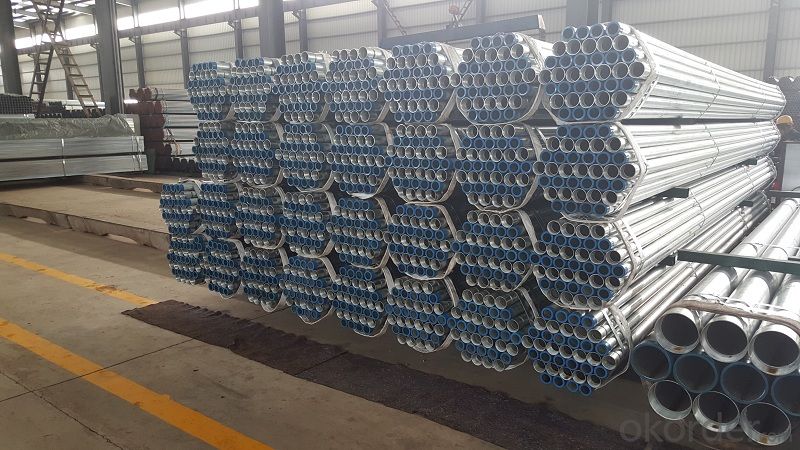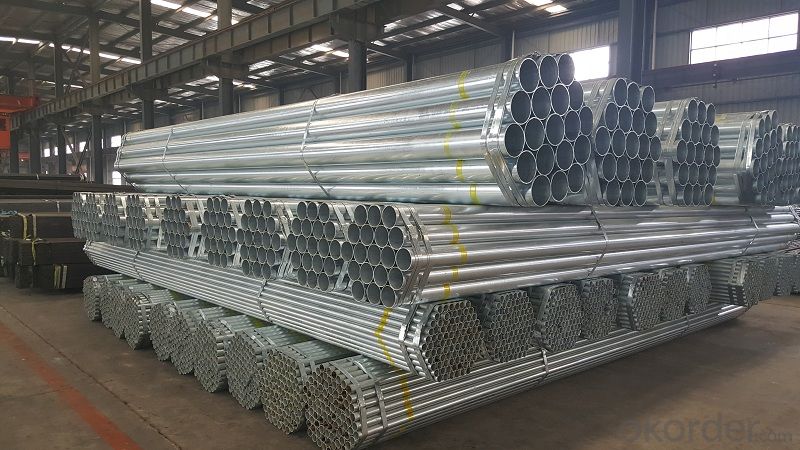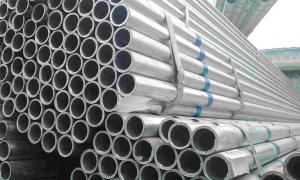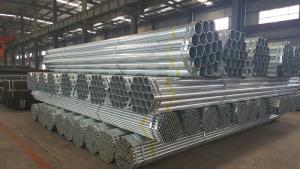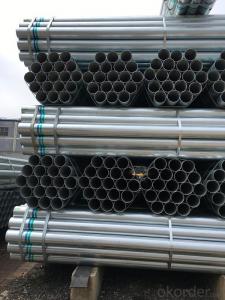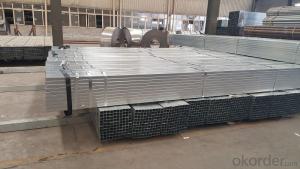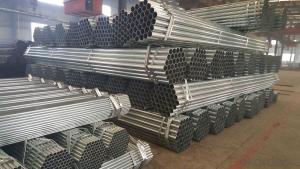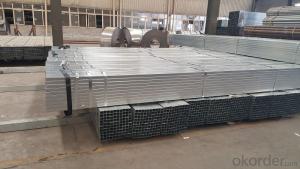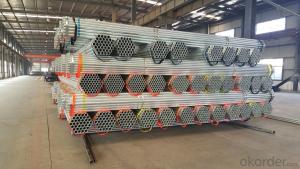Galvanized steel tubes for various medium and low pressure fluids
- Loading Port:
- Tianjin
- Payment Terms:
- TT OR LC
- Min Order Qty:
- 20 m.t.
- Supply Capability:
- 13000 m.t./month
OKorder Service Pledge
OKorder Financial Service
You Might Also Like
Specification
1、Structure of Galvanized steel tubes for various medium and low pressure fluids
:
The surface of galvanized steel pipe welded steel pipe of hot dip galvanized layer or. Galvanized can increase the corrosion resistance of the steel tube, prolong service life. Galvanized pipe is widely used, in addition to water, gas, oil and other general low pressure fluid pipelines. It is also used in the petroleum industry, especially for offshore oil field of oil well pipe and oil pipe, chemical, coking equipment of oil heater, condensation cooler, coal run oil exchanger tube, and trestle pile, the mine tunnel support frame tube.
2、Main Features of Galvanized steel tubes for various medium and low pressure fluids
:
• High manufacturing accuracy
• High strength
• Good visual effect
• Reasonable price
3、 Galvanized steel tubes for various medium and low pressure fluids Specification:
Standard | GB, DIN, ASTM ASTM A106-2006, ASTM A53-2007 |
Grade | 10#-45#, 16Mn 10#, 20#, 45#, 16Mn |
Thickness | 1 - 33 mm |
Section Shape | Round |
Outer Diameter | 21 - 610mm |
Place of Origin | Tianjin, China (Mainland) |
Secondary Or Not | Non-secondary |
Application | Hydraulic Pipe |
Technique | Cold Drawn |
Certification | API |
Surface Treatment | factory state or painted black |
Special Pipe | API Pipe |
Alloy Or Not | Non-alloy |
Length | 5-12M |
Outer Diameter | 21.3-610mm |
Grade | 20#, 45#, Q345, API J55, API K55, API L80, API N80, API P110, A53B |
Standard | ASME, ASTM |
1) Material:Q195 Q235 Q345 X42 X52
2) Specification range:OD:21.3-610mm,WT:6-70mm,length:6-12m or according to the requirement of clients.
3) Excutive standards:GB,ASME API5L.ASTM A 106/A53,Despite of the above standards,we can also supply seamless steel pipe with standard of DIN,JIS,and so on,and also develop new products according to the requirements of our clients!
4) Surface: galvanized.
5) Ends:Beveled or square cut,plastic capped,painted.
6) Packing:bundles wrapped with strong steel strip,seaworthy packing.
4、Packaging & Delivery
Packaging Details: | seaworthy package,bundles wrapped with strong steel strip |
Delivery Detail: | 15-30days after received 30%TT |
5、FAQ of Galvanized steel tubes for various medium and low pressure fluids
①How is the quality of your products?
Our products are manufactured strictly according to national and internaional standard, and we take a test
on every pipe before delivered out. If you want see our quality certifications and all kinds of testing report, please just ask us for it.
Guaranteed: If products’ quality don’t accord to discription as we give or the promise before you place order, we promise 100% refund.
②How about price?
Yes, we are factory and be able to give you lowest price below market one, and we have a policy that “ for saving time and absolutely honest business attitude, we quote as lowest as possible for any customer, and discount can be given according to quantity”,if you like bargain and factory price is not low enough as you think, just don’t waste your time.Please trust the quotation we would give you, it is professional one.
③Why should you chose us?
Chose happens because of quality, then price, We can give you both.Additionally, we can also offer professional products inquiry, products knowledge train(for agents), smooth goods delivery, exellent customer solution proposals.Our service formula: good quality+good price+good service=customer’s trust
SGS test is available, customer inspection before shipping is welcome, third party inspection is no problem.
6、 Galvanized steel tubes for various medium and low pressure fluids Images:
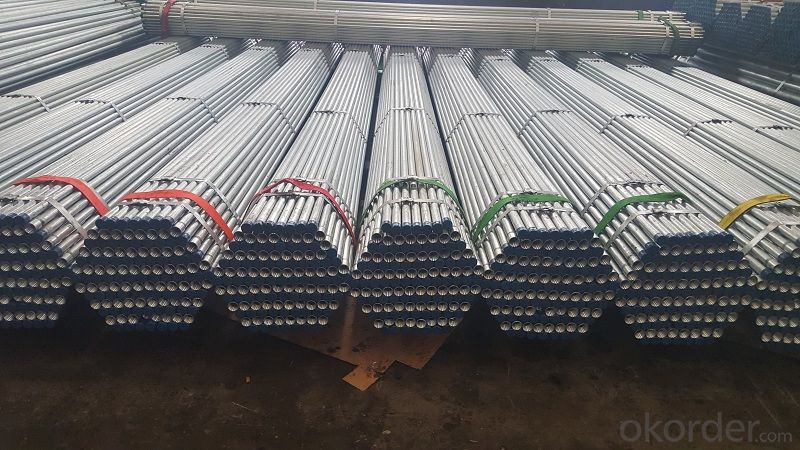
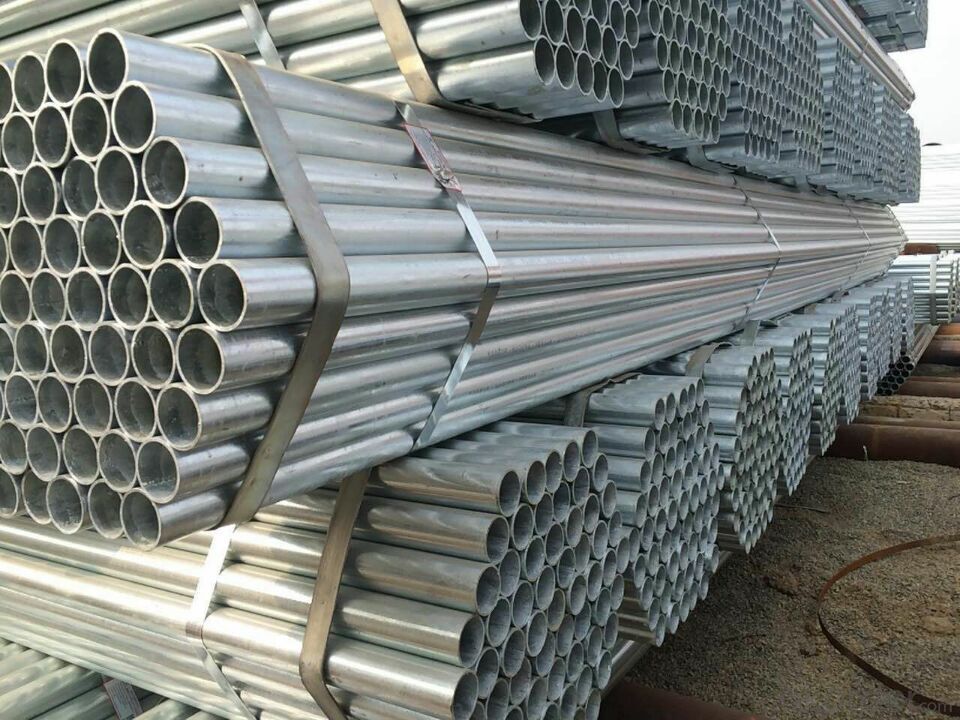
- Q: What is the outer diameter and wall thickness of the welded steel pipe of national standard DN250?
- DN250 is the nominal diameter, the outer diameter of the steel pipe is 273mm, the thickness is above 6.5mm.
- Q: How do you solder purple copper plate and steel tube?
- When the copper pipe and the size is not too large, such as 10 mm below the pipe welding, brazing is suggested, with brass solder, such as Wei Odin 201 solder, with supporting solder paste, with a neutral flame welding, the copper plate is heated to about 800 degrees, and then use the solder with 201 Wei Odin 201-F in solder welding, welding wire with melt molding.
- Q: Are steel pipes resistant to UV radiation?
- Yes, steel pipes are generally resistant to UV radiation. UV radiation is known to cause damage to materials over time, such as fading, discoloration, and degradation. However, steel pipes are typically coated with protective layers, such as paint or galvanization, which help to shield them from UV radiation. These coatings act as a barrier, preventing the direct exposure of steel to UV rays and minimizing the potential for damage. Additionally, the inherent properties of steel, including its strength and durability, make it less susceptible to the effects of UV radiation compared to other materials like plastics or rubber. However, it is important to note that prolonged exposure to intense UV radiation can still have some impact on steel pipes, such as slight discoloration or surface degradation. Regular maintenance and inspection are recommended to ensure the continued performance and longevity of steel pipes in outdoor or UV-exposed environments.
- Q: How are steel pipes sized and classified?
- Steel pipes are sized and classified based on their outer diameter, wall thickness, and length. The sizing is done using standard measurements such as nominal pipe size (NPS) or nominal diameter (DN). Classification is determined by factors such as the pipe's pressure rating, material composition, and intended use. This helps ensure compatibility and proper installation in various applications such as plumbing, construction, and industrial processes.
- Q: How many meters per ton of steel tube?
- General scaffolding tube diameter 40mm, specifications specify wall thickness of 3.5mm, the actual wall thickness of 3.2 - 3.4mm.The theoretical weight per meter is 3.85kg and the wall thickness is 3mm.Hence a ton of steel is about 260m.
- Q: What is the role of steel pipes in HVAC systems?
- Steel pipes are crucial components in HVAC systems as they are used to transport hot and cold water throughout the system. They provide a durable and reliable means of distributing heat or cooling energy to various parts of a building. Steel pipes are known for their high strength and resistance to corrosion, making them an ideal choice for HVAC applications.
- Q: Can steel pipes be coated for aesthetic purposes?
- Yes, steel pipes can be coated for aesthetic purposes. Coating steel pipes not only adds a visually appealing finish but also provides protection against corrosion and other environmental factors. There are various coating options available for steel pipes, such as powder coating, epoxy coating, and vinyl coating, among others. These coatings can be applied in different colors and textures to enhance the appearance of the pipes and complement the surrounding environment. Whether in industrial settings, architectural projects, or decorative applications, coating steel pipes can transform them into visually appealing elements while maintaining their structural integrity.
- Q: What is the maximum allowable pressure for steel pipes?
- The maximum allowable pressure for steel pipes depends on various factors such as the type of steel used, the diameter and thickness of the pipe, and the specific application or industry requirements. The American Society of Mechanical Engineers (ASME) provides guidelines and standards for pressure vessel and piping design, including the determination of maximum allowable pressure. ASME B31.1 and B31.3 are widely used codes for power piping and process piping respectively. These codes specify the design criteria for various materials, including steel, and provide formulas and charts to calculate the maximum allowable pressure for different pipe sizes and wall thicknesses. The maximum allowable pressure is typically determined based on the pipe's ability to withstand internal pressure without causing any permanent deformation or failure. It is important to note that the maximum allowable pressure for steel pipes may also be influenced by other factors such as temperature, corrosion, and the presence of any external loads or stresses. Therefore, it is essential to consult the relevant codes, standards, and engineering calculations specific to the application to ensure the safe and reliable operation of steel pipes under the given conditions.
- Q: Galvanized steel pipe in addition to good rust resistance, what are the advantages?
- It has the characteristics of corrosion resistance and wear resistance, so it can be used longer;
- Q: How do you calculate the pipe thermal expansion coefficient for steel pipes?
- The pipe thermal expansion coefficient for steel pipes can be calculated using the formula: α = (L2 - L1) / (L1 * (T2 - T1)) Where: α is the pipe thermal expansion coefficient L1 is the initial length of the pipe L2 is the final length of the pipe T1 is the initial temperature of the pipe T2 is the final temperature of the pipe. This formula takes into account the change in length and the change in temperature to determine the coefficient of thermal expansion for steel pipes.
Send your message to us
Galvanized steel tubes for various medium and low pressure fluids
- Loading Port:
- Tianjin
- Payment Terms:
- TT OR LC
- Min Order Qty:
- 20 m.t.
- Supply Capability:
- 13000 m.t./month
OKorder Service Pledge
OKorder Financial Service
Similar products
Hot products
Hot Searches
Related keywords
